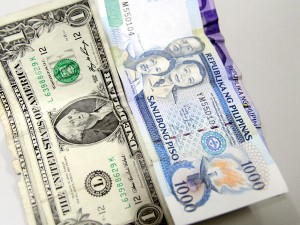Peso slumps to 43-to-dollar level as US, Japan slow down stimulus programs
MANILA, Philippines — The peso slumped on Tuesday, weakening back to the 43-to-a-dollar territory as signals that the US and Japanese central banks are allowing their stimulus programs to taper off dampened appetite for emerging market currencies.
The local currency closed at 43.20 against the US dollar, falling by 42 centavos from Monday’s finish of 42.78:$1. The latest finish was the weakest since June last year.
Intraday high hit 42.95:$1, while intraday low settled at 43.25:$1. Volume of trade amounted to $1.48 billion compared with $1.208 billion previously.
The depreciation of the peso and other emerging market currencies on Tuesday came following reports that the Japanese central bank, the Bank of Japan (BOJ), in the latest policy-setting meeting of its officials, simply maintained their existing monetary policy. This is contrary to market expectations that the BOJ would announce even more aggressive bond purchases, which are meant to inject liquidity to the Japanese economy and lift it from its deflation woes.
The fall of the peso and other emerging market currencies likewise came amid reports that the US Federal Reserve is considering to temper its own bond purchases given early signs that the world’s biggest recovery is poised for a more substantial recovery this year.
Bond purchases by the BOJ and the US Fed significantly boost global liquidity, portions of which normally spill over to emerging markets like the Philippines in the form of foreign portfolio investments.
Traders said that news about a slowdown in the bond purchases, therefore, are seen to eventually cause an easing of foreign-exchange inflows to emerging markets and depreciation of their currencies. Yield-seeking investors normally take advantage of such projections by buying dollar-denominated assets, thereby actually causing emerging-market currencies to depreciate.
Market players likewise said fund owners were expecting the BOJ to announce an even more aggressive policy stance against deflation, but that did not happen. This raised some doubts on whether the existing stimulus program would indeed be enough to help Japan reverse the deflation and boost its economy.
Japan is one of the biggest export markets for Philippine-made goods.
The drop in the peso was fueled partly by withdrawals in the Philippine Stock Exchange. The main index fell 318.95 points to close at 6,556.65.
